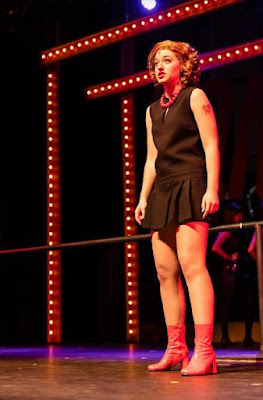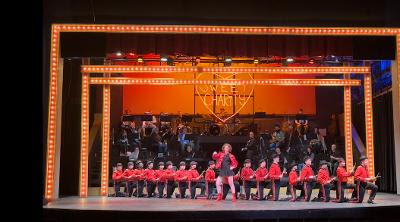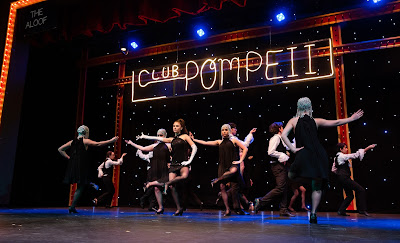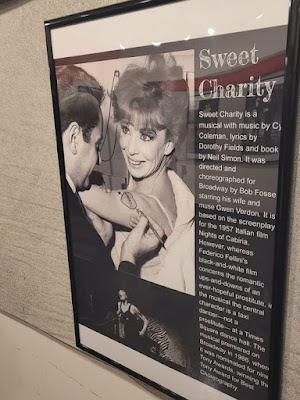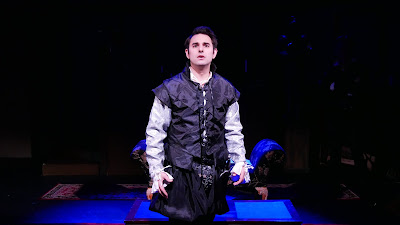By James V. Ruocco
A spirited, kind-hearted musical from 1966 enjoying a cheery revival at Kingswood Oxford, "Sweet Charity" - originally produced on Broadway with Gwen Verdon in the title role and featuring choreography created by her then-husband Bob Fosse - is draped and configured with the kind of red-carpet optimism and resilience guaranteed to make everyone in the audience stand up and cheer.
And cheer, they do.
This "Sweet Charity" is trumped up in glorious Technicolor that never once gets out of sync.
It's imaginative and good-natured.
It's an exercise in nostalgia chock full of big song-and-dance numbers.
It's imaginative and good natured.
It's got style.
It's got feeling.
It's sweet-sounding with dazzling choreographic verve.
It also comes gift-wrapped with a cast of more than 30 Kingswood Oxford students primed and ready to tackle the musical's 1960's songs, ballads and ensemble numbers and its stylized, invigorating choreography designed to reflect and pay homage to the late, great Bob Fosse. And lastly, its essential footing and atmospheric environs.
Written by the late Neil Simon ("The Odd Couple," "Barefoot in the Park"), the two-act musical tells the story of Charity Hope Valentine, an attractive New York dance hall hostess (i.e., taxi dancer) looking for love and finding it, only to be denied a happy ending once her nerdy, neurotic boyfriend Oscar Lindquist gets cold feet and walks away during the musical's final minutes.
"Did you ever have one of those days?" she tells the audience. "At least I didn't get tattooed again. And I still have my dowry. Maybe things are beginning to look up for me."
Not to worry, though.
A sign appears high above the proscenium stage and reads: "And so she lived hopefully ever after."
Simon, as playwright, portrays the title character's romantic journey through a series of sparkling comedic moments and conversation filled with laugh lines, optimism, drama, heartache and supportive female chum characters that carry the musical forward with effectively paced accomplishment, build up and payoff. Strategically placed, important musical numbers and choreography heighten the experience.
Staging "Sweet Charity," Kyle Reynolds, Director of Theater at Kingwood Oxford, brings a vigorous, kinetic energy to the production that produces spark and dash from a bygone era laced with plenty of sizzle, razzle dazzle, smooth talk, irony, humor and unstoppable juggernaut. Directorially, there's notable precision and distinctive strength here mixed with the playful timber, motif, character and facilitated subscription of traditional Broadway musical theatre.
It all comes together seamlessly from scene to scene, song to song and act to act. More importantly, it's all swiftly incorporated into a 145-minute run (not counting intermission or opening night talks and fundraising auctions with the audience) highlighted by perfectly timed scene changes, sound and light cues and ace instrumental accompaniment by the orchestra.
The use of above stage screen projections that light up from time to time the to reveal locations, mood swings and dilemmas ("Girl Who Wanted to Be Loved," "A Big Decision," "To Be Continued," "Meanwhile Back in the Elevator") is seamlessly interspersed throughout the two-act musical with genuine, feel-good panache and humor.
Creativity on Reynold's part (he also choreographs all but two of the production's big dance numbers) is the root of this musical telling. Given the musical's origins - Federico Fellini's 1957 Italian language film "Nights of Cabiria;" the Bob Fosse/Gwen Verdon legacy; book by Neil Simon - he takes hold of the material, whips it into shape and moves it from the rehearsal hall to the vast space of the Roberts Center with full-bodied start and finish acumen.
This isn't standard repertoire. It's big, loud, grand and bold musical theatre.
It all has to be inked, dotted and synced in accordance with the original blueprint of its collaborators, a daunting task that Reynolds greets with enthusiasm, order, flair, improvisation and entitlement.
That said, his "Sweet Charity" respects, understands and celebrates the style and talent of its predecessors from Fellini-like images, postering and character preening reminiscent of both "Nights of Cabiria" and "La Dolce Vita" to obvious staging and dance techniques that pay homage to "Hair," "Chicago" and West Side Story," among others, ingeniously incorporated into the ongoing story by Reynolds and assistant choreographer Meghan McDermott.
Bursting with ideas, classic unlucky-in-love associations and lots and lots of heart, the musical score for "Sweet Charity," written by Cy Coleman (music) and Dorothy Fields (lyrics) is a product of the times - similarities to "Mame," "Funny Girl," "Hello, Dolly!" "Golden Rainbow" and She Loves Me" immediately spring to mind - and the 1960's Broadway mindset from whence it came.
It is fun. It is kitschy. It is sweet and sentimental. It is plot driven. It is melodic. It is hummable.
It's a star vehicle.
Its woven textures, playful bounce, swing and lyrical expressionism are filtered through 14 deftly positioned, energetically arranged musical numbers. They are: "You Should See Yourself," "Big Spender," "Charity's Soliloquy," "Rich Man's Frug," "If My Friends Could See Me Now," "Too Many Tomorrows," "There's Gotta Be Something Better Than This," "I'm the Bravest Individual," "The Rhythm of Life," "Baby, Dream Your Dream," "Sweet Charity," "Where Am I Going?" "I'm a Brass Band" and "I Love to Cry at Weddings."
As musical director, Steve Mitchell, Kingswood Oxford Director of Choral Music, takes hold of the "Sweet Charity" musical score and guides it with a steady and sure hand, capturing its rhythmic dynamic, its acoustical energy, its imbued push and pull and its inspired musicality.
This is a fun Broadway score crafted, developed and orchestrated by Coleman and Fields with syncopated diligence and soundscape that Mitchell and his 18-member orchestra evoke with a nostalgic thrust full of reminiscences, references and inspiration that are not only pleasant to the ear, but lovingly in sync with the theme, the sound and the turning points and evolution of the original 1966 Broadway musical.
When necessary, some of the musical numbers are creatively extended - "The Rhythm of Life," "I'm a Brass Band," "There's Gotta Be Something Better Than This," for example - for story, dance, choral and dance purposes with subtle revisions and beats that heighten their already-proven accent and dimension. The orchestra also gets a big solo spot halfway through Act II reminiscent of those posh, popular New York supper clubs of the 1940s and the 1950s and the big band stretch motifs employed by those live shows integrated between all those classic romantic comedies that once played the Radio City Music Hall.
A regular fixture of "Sweet Charity" and one that thrust the musical center stage for eight performances a week on Broadway during its original 1960's run at the Palace Theatre was Bob Fosse's choreography - a dazzling feat of quality, skill and exquisite partnership.
Jazz hands. Turned in knees. Curved shoulders. Synchronized movement shifting from fast to slow then back again. That was (and is) signature Fosse.
Here, at Kingswood Oxford, choreographers Kyle Reynolds and assistant Meghan McDermott dig deep to give an immaculate account of everything Fosse, creating fluid, iconic movement - in all its forms - mirroring the flashes of brilliance, stylization, detail and parodying concurrent in the musical's dance aesthetic. It's a process pierced with wonder and imagination that bobs and sweeps with animated aplomb which the cast sells with organic spooling, imagination and theatricalized sway and swagger. So much so the genius that is Fosse never once leaves the stage, a compliment of the highest order to both Reynolds, McDermott and their hard-working company of actors, singers and dancers.
"The Rhythm of Life," a tangy paean to the hippie movement of the 1960s finds Reynolds paying tribute to "Hair" using the signature stylization and oomph of Fosse which he implements through choice beats, tilts, spins and turns that recall the song-sermon spiritual angst of the original Broadway Act II musical number, offset by his own thrilling, defined creative choices. As Big Daddy, the cult leader of the Rhythm of Life Church, Zaire Ramiz delivers a rousing vocal turn, amplified impressively with a heavy-hitting choral gospel treatment from the acid-tipped hippie ensemble.
With "There's Gotta be Something Better for This," a jazzy, breezy cry for help (i.e., a real job with real hours and real benefits) from the Fandango Ballroom trio of Charity, Nikki and Helene, played respectively by McKenzie Campbell, Faith Potter and Diya Mistri, McDermott mixes elements from both the 1966 Broadway and 1969 film adaptation of "Sweet Charity" (a great idea) to produce a frenzied dance free-for-all that snaps, pops, twirls and cajoles with fierce, wild Fosse abandon and frenzy. The addition of several Fandango taxi dancers to the musical number (originally, it was just danced and sung by Gwen Verdon, Helen Gallagher and Thelma Oliver) adds a "West Side Story" (think rooftop "America" without Anita) flair and zing to the number that heightens its already tremendous choreography and catchy dance about.
The iconic "Big Spender," a flashy, moody, no-nonsense musical number where the Fandango Ballroom taxi dancers flirt and proposition male customers for money and a quick dance ("Hey mister can I talk to you for a minute; Hey fella, ya wanna dance? I could give you some fun") is a sensational, driven and epic dance number showcasing the athleticism and emotional expressionism of the Fosse "Sweet Charity" legacy that Reynolds adapts and triggers with an innate, up-close-and-personal stamp that rises from the ground, stands up right, front, tall and center and seduces and entices the theatergoer with ovation-worthy sparkle and representation. "Rich Man's Frug," a Fellini-like showstopper performed with "La Dolce Vita" abandon furthers that concept as McDermott turns up the heat for a 1960's Italian bacchanalian night club dance fest of pleasurable movement connected to the dots of the past, its ritualistic rhythms, its twirling, transfixed heads and its impactive luminosity.
"I'm a Brass Band," a well-known Fosse song-and-dance number that here, is designed to transform this particular "Sweet Charity" segment at Kingswood Oxford into a "Music Man" declaration of "hopefully ever after scenario " for the show's leading lady, is etched with such spark, static and buzz and organized illumination, if there was a "'replay" button attached to the seats, a second viewing would be mandatory. It's big, grand and drop-dead spectacular, replete with a drumming chain-and-mix sequence (no drums; just drumsticks) that Reynolds shapes with thrilling, showstopping acumen. "I Love to Cry at Weddings," a splashy ensemble number celebrating Charity and Oscar's pending nuptials also scores high points not only for its breezy choreographic inventiveness by Richards, but for Gordon Beck's (he plays Herman, Charity's boss and owner of the Fandango Ballroom) skilled, smooth, unstoppable crowd-pleasing solo turn, with able support from the ensemble. If anyone is doing a teen version of "Guys and Dolls," Beck is the perfect fit for the part of Nation Detroit or Nicely-Nicely Johnson.
In the lead role of Charity Hope Valentine, a dance hall hostess with a knack for falling for the wrong men, McKenzie Campbell, like others before her - namely Gwen Verdon, Tamzin Outhwaite, Anne- Marie Duff, Christina Applegate, Molly Ringwald - comes to "Sweet Charity" investing real talent, real energy, real vulnerability, real charm and real vocal star power into one of musical theater's most demanding roles ever written for a female.
It's a part imbued with the lived-in, spirited persona, similar to that of Giulietta Masina in Fellini's "Nights of Cabiria," etched and inked with the dabs of imagination, grin, aesthetic, wistfulness and passion from Simon's cheeky, playfully sifted play text, Fosse's megawatt dance blueprint for the character and the Sutton Foster Broadway leading lady handbook for musical theatre performance.
On stage at Kingswood Oxford, Campbell's "big heart for yearning for love" performance is effervescent, joyful, seductive, genuine, unbreakable and Broadway smooth. Vocally, she is at the top of her game, belting out song after song - "You Should See Yourself," "Charity's Soliloquy," "If They Could See Me Now," "There's Gotta Be Something Better Than This," "Where Am I Going?" "I'm A Brass Band," - with just the right amount of percussive, in-the-moment conviction, echoing the Coleman/Fields vocal conceit for the character with the buoyant energy, faded joy or sparkly red ribboning of their invention.
Faith Potter (Nickie) and Diya Mistri (Helene) enact the bold, daring well-defined supporting roles of Charity's best friends and Fandango Ballroom taxi dancers with rollicking good flair, fun, style, force and persona. Together, they each bring a sustained truth, style and dash to their characters, offset by splendid, electric-charged vocals - "Baby Dream Your Dream," "Big Spender," "There's Gotta Be Something Better Than This" - that beautifully convey their smashing, faultless musicality. Luke Roen's portrayal of Charity's unstrung, neurotic boyfriend Oscar Lindquist is an infectious mix of Felix Unger "Odd Couple" flibbertigibbet madness, fleshed out with contagious tick and sight-gag-giggle accompaniment. His first meeting with Charity - they get trapped in stalled elevator at New York's Ninety-second Street "Y" - is great comic fun that eventually leads to "I'm the Bravest Individual," an enjoyable comic duet peppered with lyrical tonic, flutter and carefully sifted sit-com desperation by both performers.
It is nostalgic. It is whimsical. It is striking. It is theatrical. It is splashy. It is stylish.
It is also a labor of love - Kyle Reynolds, Meghan McDermott, Steve Mitchell, costume designer Jack Richards, duly noted - anchored by the showstopping performance of McKenzie Campbell, a Kingwood Oxford student who comes to the Roberts Center stage leading a big song-and-dance parade of her own backed by a team of players - lead, supporting and chorus - united as one to perform one helluva revival celebrating the Fosse/Verdon legacy.

